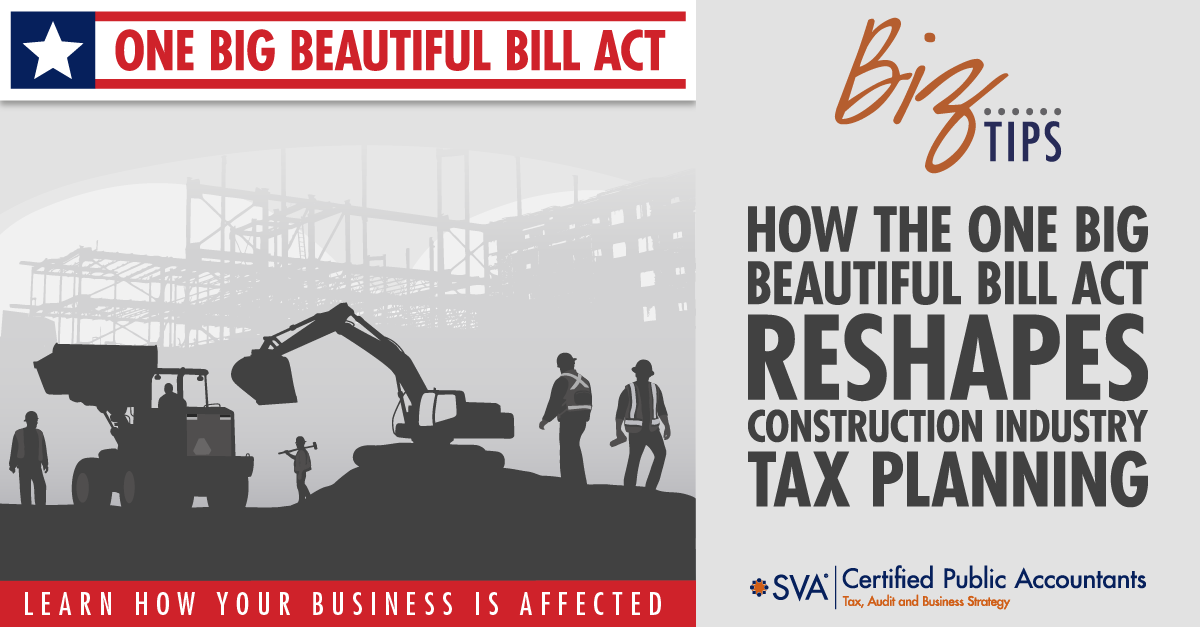| Highlights: |
- Summarizes how the One Big Beautiful Bill Act (OBBBA) significantly changes tax planning for construction firms with new deductions, deferral options, and planning strategies under permanent and expanded provisions.
- Explains key provisions such as permanent 100% bonus depreciation, increased Section 179 limits, enhanced interest and QBI deductions, and new revenue recognition flexibility for both commercial and residential projects.
- Emphasizes practical impacts on cash flow, capital investment decisions, accounting methods, and succession planning, with actionable considerations for contractors, developers, and specialty trades.
|
The recently passed One Big Beautiful Bill Act (OBBBA) is shaking up the tax landscape, and for construction companies, that’s good news. The legislation includes several tax updates that directly affect contractors, developers, and specialty trades across both commercial and residential sectors.
(Download Video Transcript)
10 Changes the OBBBA is Making to the Construction Industry
Let’s take a look at how these changes could affect your construction business and why now is the time to revisit your tax strategy.
1. Bonus Depreciation and Section 179: Buy It, Write It Off
If your construction business relies heavily on equipment and vehicles, take note: OBBBA makes 100% bonus depreciation permanent and retroactive to January 1, 2025. That means you can fully deduct the cost of qualifying assets the year you purchase them, no more phaseouts or guesswork.
In addition, Section 179 expensing limits have increased. You can now expense up to $2.5 million in assets, with the phase-out starting at $4 million of total asset purchases. This is especially helpful for small to mid-sized contractors looking to invest in tools, equipment, technology, or vehicles without waiting years to realize the tax benefit.
2. Interest Deductions Just Got More Generous
Previously, businesses could only deduct interest expense up to 30% of their earnings before interest and taxes (EBIT). Now, OBBBA lets you calculate that limit based on EBITDA, meaning depreciation and amortization are added back in. The result? More interest becomes deductible, which is a win for capital-intensive firms financing growth with loans or leases.
3. R&D Deduction Reinstated (Yes, Construction Companies Qualify)
From 2025 through 2029, domestic research and experimental (R&E) expenditures can be deducted immediately. This is a big shift from recent rules that required these costs to be amortized over five years.
If your business invests in construction process improvements, sustainability innovations, or tech-enabled workflows, these R&D activities may qualify. If your business was required to capitalize R&D expenses, you can now catch up on these prior capitalized expenses, by deducting these in 2025 or split over 2025 or 2026.
And, smaller businesses with under $31 million in annual gross receipts may be able to apply this retroactively with an amended return.
4. Pass-Through Tax Relief: QBI Deduction Becomes Permanent
The 20% deduction for Qualified Business Income (QBI) is now a permanent part of the tax code. This allows pass-through entities including S corps, partnerships, and sole proprietors to maintain a lower effective federal tax rate (down to 29.6%).
For many construction firms that operate as pass-throughs, this provides ongoing relief and simplifies long-term tax planning.
5. Expanded Tax Deferral for Residential Construction Contracts
Previously, only home construction contracts with four or fewer units could defer income using the completed-contract method. OBBBA expands that to include larger-scale residential projects, such as apartment buildings, condos, student housing, long-term care, prisons, and mixed-use developments where residential costs are the majority.
This change is huge for developers and builders. Rather than recognizing income throughout the build (even if you haven’t been paid yet), you can now defer it until the project is substantially complete, improving cash flow and simplifying accounting.
Smaller contractors also benefit. If your average annual gross receipts are under $31 million and the project will be done within three years, you may qualify regardless of whether the project is residential.
6. Subcontractors May Also Benefit
Electrical, HVAC, plumbing, roofing, drywall, concrete, and other trades may qualify for these deferral rules, too, if 80% or more of their contract costs are tied to qualifying residential projects. While the bill doesn’t spell it out, the interpretation is consistent with prior tax treatment for home construction contracts.
7. Green Energy Incentive Expirations: Act Fast
OBBBA accelerates the end date for two popular energy-related construction incentives:
| Section 179D (energy-efficient commercial buildings) |
will sunset for construction beginning after June 30, 2026. |
| Section 45L (energy-efficient residential homes) |
will sunset for properties acquired after June 30, 2026 |
If you're planning projects that rely on these credits, it’s time to evaluate your timelines and fast-track where possible.
8. More Flexibility with SALT Deductions
The state and local tax (SALT) deduction cap has increased from $10,000 to $40,000 from 2025 through 2029 (phasing down for higher-income taxpayers). For many construction business owners in high-tax states, this means more deductions and a better after-tax cash flow position. However, there may be new phase-outs that apply.
9. Overtime Deduction for Workers
Through 2028, qualified overtime compensation can be deducted above the line, up to $12,500 per person ($25,000 for married couples). This is great news for your workforce during busy seasons and a small but meaningful way to boost retention and take-home pay in labor-intensive roles.
10. Estate and Gift Tax Exemption Increased
Privately owned construction companies often struggle with succession planning due to estate tax exposure. Starting in 2026, individuals can shield up to $15 million (and couples up to $30 million) from estate and gift tax, indexed for inflation. That’s a significant planning opportunity for owners looking to pass the business to the next generation.
What Now?
There’s a lot in the OBBBA, and many of the construction-focused changes are already in effect or starting soon. It’s worth setting time aside to:
- Reassess 2025 estimated tax payments
- Review project timelines and contract structures
- Talk with your tax advisor about entity setup and deferral opportunities
- Explore whether your subcontracting activities meet the 80% threshold
- Accelerate qualifying green construction projects
Construction businesses operate on tight margins, long timelines, and fluctuating cash flow. These updates offer an opportunity to optimize your tax position while reinvesting in your team, your tools, and your future.
Need Help Navigating the Changes?
Our construction industry specialists are here to help you evaluate how the new rules apply to your projects, structure your contracts effectively, and plan your tax strategy with confidence.
© 2025 SVA Certified Public Accountants

